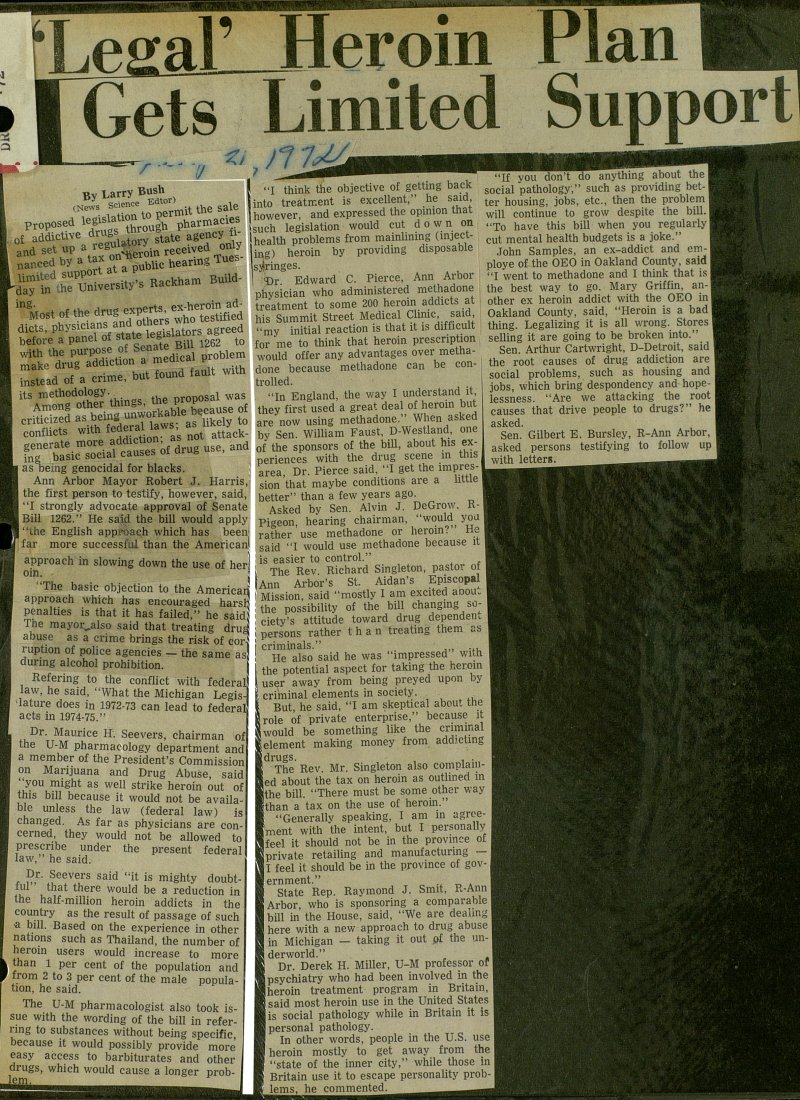'Legal' Heroin Plan Gets Limited Support

(New. bclenl-%n;ermit the sale Proposedlegislaüwtógrmi L5K5SK L as benig genocidal for blacks. Ann Arbor Mayor Robert J. Harris, the first person to testify, however, said, "I strongly advocate approval of Senate ■ Bill 1262." He said the bill would apply n"ihe English approach which has been l[ f ar more successful than the American I approach in slowing down the use of her I oin. "The basic objection to the Americaij approach which has encouraged harsi; penalties is that it has failed," he said The mayoivalso said that treating drug: abuse as a crime brings the risk of cor ruption of pólice agencies - the same as dunng alcohol prohibition. Refering to the conflict with federal law, he said, "What the Michigan Legis-I 'lature does in 1972-73 can lead to federad acts in 1974-75." Dr. Maurice H. Seevers, chairman of the U-M pharmacology department and a member of the President's Commission on Marijuana and Drug Abuse, said "you might as well strike heroin out of this bill because it would not be available unless the law (federal law) is changed. As far as physicians are concerned, they would not be allowed to prescribe under the present federal law," he said. Dr. Seevers said "it is mighty doubtful ' that there would be a reduction in the half-million heroin addicts in the country as the result of passage of such a bill. Based on the experience in other nations such as Thailand, the number of heroin users would increase to more than 1 per cent of the population and from 2 to 3 per cent of the male population, he said. The U-M pharmacologist also took issue with the wording of the bill in refernng to substances without being specific because it would possibly provide more easy access to barbiturates and other drugs, which would cause a longer I "I think the objective of getting back into treatment is excellent," he said, however, and expressed the opinión that such legislation would cut down on health problems from mainlining (mjecting) heroin by providing disposable siringes. 'ür Edward C. Pierce, Ann Arbor physician who administered methadone treatment to some 200 heroin addicts at his Summit Street Medical Clinic, said "my initial reaction is that it is difficult for me to think that heroin prescnption would offer any advantages over methadone because methadone can be contrnlled. "In England, the way I understand ït they first used a great deal of heroin but are now using methadone." When asked by Sen. William Faust, D-Westland, one Df the sponsors of the bill, about his experiences with the drug scène in this area, Dr. Pierce said, "I get the impression that maybe conditions are a Mtle I better" than a few years ago. Asked by Sen. Alvin J. DeGrow. RPigeon, hearing chairman, "would y oa rather use methadone or heroin? He said "I would use methadone because ït is easier to control." The Rev. Richard Singleton, pastor ot Ann Arbor's St. Aidan's Episcopal Mission, said "mostly I am excited aoou. the possibility of the bill changing society's attitude toward drug dependen, persons rather than treating them as crimináis" He also said he was "ïmpressed wim he potential aspect for taking the heroin iser away from being preyed upon by criminal elements in society. But, he said, "I am skeptical about the role óf private enterprise," because ít would be something like the criminal element making money from addicting The Rev. Mr. Singleton also cpmplained about the tax on heroin as outlined ín. the bilí. "There must be some other way han a tax on the use of heroin." "Generally speaking, I am in agreement with the intent, but I personally feel it should not be in the province of private retailing and manufacturing - I feel it should be in the province of 1 ernment." . State Rep. Raymond J. Smit, R-Ann Arbor who is sponsoring a comparable bilí in the House, said, "We are dealing here with a new approach to drug abuse in Michigan - taking it out of the underworld." Dr. Derek H. Miller, U-M professor of psychiatry who had been involved in the heroin treatment program in Britain, said most heroin use in the United States is social pathology while in Britain it is personal pathology. In other words, people in the U.S. use heroin mostly to get away from the "state of the inner city," while those in Britain use it to escape personality problems, he commented. m "If you don't do anything about the I social pathology," such as providing 1 ter housing, jobs, etc, then the problem I will continue to grow despite the bill.l "To have this bill when you regularly cut mental health budgets is a joke." John Samples, an ex-addict and employé of the OEO in Oakland County, said "I went to methadone and I think that is the best way to go. Mary Griffin, another ex heroin addict with the OEO in Oakland County, said, "Heroin is a bad thing. Legalizing it is all wrong. Stores selling it are going to be broken into." Sen. Arthur Cartwright, D-Detroit, said the root causes of drug addiction are social problems, such as housing and jobs, which bring despondency and hopelessness. "Are we attacking the root causes that drive people to drugs?" he asked. Sen. Gilbert E. Bursley, R-Ann Arbor, asked persons testifying to follow up with letters. mm
Article
Subjects
Larry Bush
University of Michigan - Faculty & Staff
Summit Street Medical Center
St. Aidan's Episcopal Church
Rackham Auditorium
heroin
Drugs
Drug Laws
Drug Abuse
Ann Arbor News
Old News
William Faust
Robert J. Harris
Richard Singleton
Raymond J. Smit
Maurice H. Seevers
Mary Griffin
John Samples
Gilbert E. Bursley
Edward C. Pierce
Derek H. Miller
Arthur Cartwright
Alvin J. DeGrow